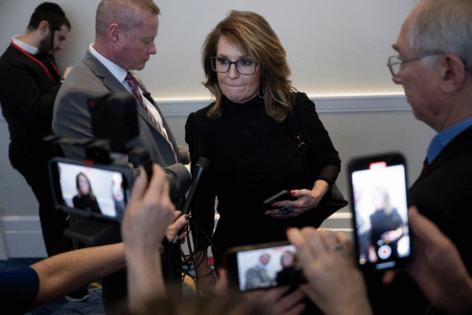Sarah Palin high-stakes libel suit is about free speech protections, NY Times lawyer says
Published in News & Features
NEW YORK — Former Alaska Gov. Sarah Palin’s high-stakes defamation lawsuit against The New York Times is about “more than words on a page” — it’s about essential protections afforded to journalists in the U.S., a lawyer for the newspaper said in opening statements Tuesday.
Felicia Ellsworth, a lawyer for the WilmerHale law firm, told a Manhattan Federal Court jury an error that remained on the newspaper’s website for 14 hours, which poorly described a graphic in Palin’s campaign literature, was not an instance of libel but an unintentional blunder protected by the First Amendment.
“The moment they realized they made a mistake, they did exactly what they should have done and they fixed it,” Ellsworth said.
“She wants this case to be about how unfairly the media has treated her,” the attorney added. “She needs to show that they actually knew that they were saying something false but said it anyway.”
The former Republican vice presidential candidate, 61, sued The Times after it ran the editorial “America’s Lethal Politics” in June 2017, which inaccurately described a digital graphic put out by her political action committee in trying to link heated political rhetoric to gun violence.
Former Times editor James Bennet had added the details to a piece written by Elizabeth Williamson after a gunman opened fire at a congressional baseball game, wounding Rep. Steve Scalise, R-La.
Bennet wrote that Palin’s digital graphic showed former Rep. Gabrielle Giffords, D-Ariz., who had been partially paralyzed in a Tucson, Arizona, mass shooting in 2011, and 19 other Democrats under stylized crosshairs. But the graphic showed their districts under crosshairs, not the officials themselves.
The case first went on trial in early 2022, when both a judge and jury determined the paper was not liable for defamation. In August, the 2nd Circuit Court of Appeals agreed with several of Palin’s arguments on appeal and sent the case back to Manhattan Federal Judge Jed Rakoff for a do-over.
The appeals court, in part, found that the case should be heard again as jurors had learned of Rakoff’s decision to toss it from push alerts while they were weighing a verdict, intruding on their deliberations. Rakoff said jurors would not have access to their phones this time around — nor their Apple watches and other gadgets.
In his opening, Palin’s attorney, Shane Vogt, who repped her at the first trial, said the former governor brought the case because The Times had not apologized to her or included her name in their correction.
“That’s why we’re here,” Vogt said.
Palin’s case is going back on trial as President Donald Trump, whose administration has sought to control what the press reports, has ramped up attacks on the media more forcefully than in his first term with a barrage of lawsuits, including a $20 billion case against “60 Minutes.” Trump has claimed, without evidence, that CBS misled the public by editing an interview with former Vice President Kamala Harris last year to make her appear “coherent.”
Free speech advocates have warned Palin’s case has been brought as a vehicle to get the Supreme Court to overturn protections for journalists included in the 1964 Supreme Court ruling in New York Times vs. Sullivan. Currently, the law safeguards reporters who make honest mistakes — not errors based on “actual malice”— setting a high burden for public officials who try to sue them over coverage they don’t like.
Vogt and his co-counsel, Ken Turkel, also repped Hulk Hogan in his landmark defamation suit against Gawker Media in 2018 for publishing his sex tape, which resulted in a mammoth jury award of about $140 million and the shuttering of the popular gossip blog before it relaunched years later. That suit, which was also widely seen as a bid to fight the 1964 Sullivan decision, was funded by Silicon Valley billionaire Peter Thiel. Palin, in 2022, refused to say who was funding her suit.
On Tuesday, Ellsworth told jurors to question why Palin didn’t contact the newspaper for a correction when she came across the error, but contacted Vogt instead — and why she wasn’t“seeking a cent.”
“This case is about more than words on a page,” Ellsworth said. “You’ve all heard of the First Amendment, you know it protects freedom of speech … But freedom of speech also protects people who make a honest mistake.”
--------------
©2025 New York Daily News. Visit at nydailynews.com. Distributed by Tribune Content Agency, LLC.







Comments